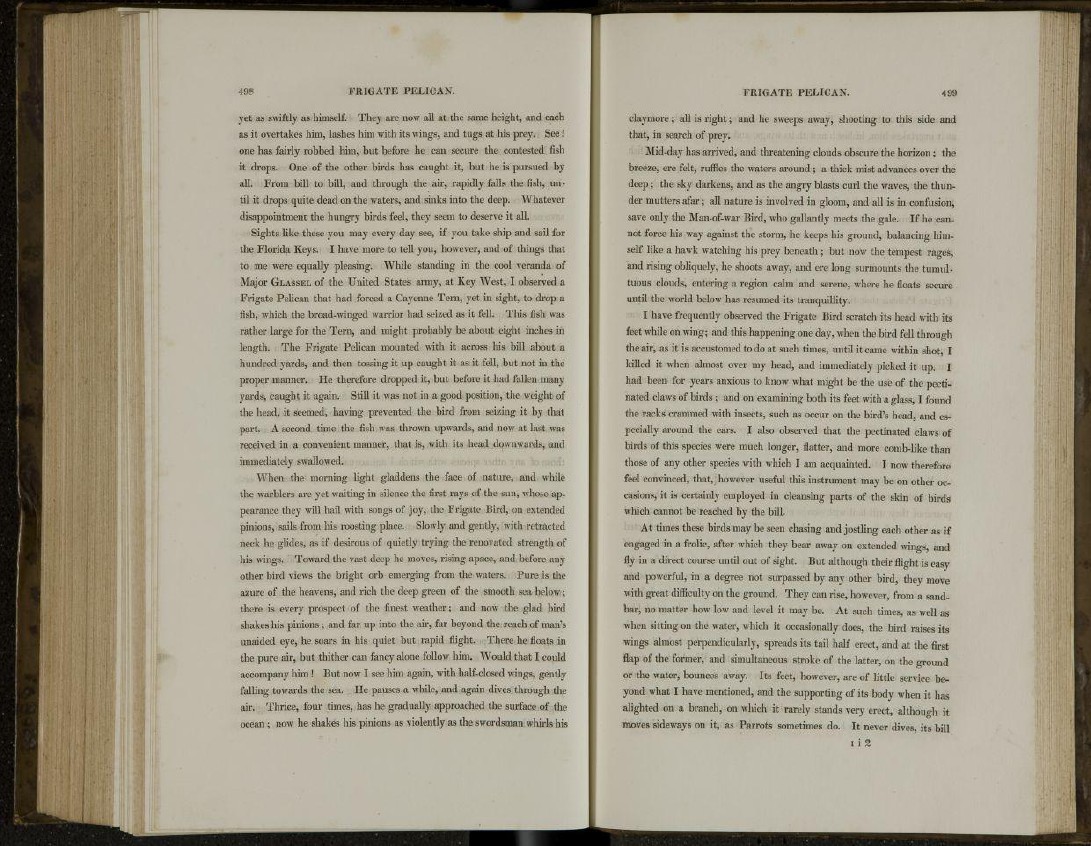
yet as swiftly as himself. They are now all at the same height, and each
as it overtakes him, lashes him with its wings, and tugs at his prey. See !
one has fairly robbed him, but before he can secure the contested fish
it drops. One of the other birds has caught it, but he is pursued by
all. From bill to bill, and through the air, rapidly falls the fish, until
it drops quite dead on the waters, and sinks into the deep. Whatever
disappointment the hungry birds feel, they seem to deserve it all.
Sights like these you may every day see, if you take ship and sail for
the Florida Keys. I have more to tell you, however, and of things that
to me were equally pleasing. While standing in the cool veranda of
Major GLASSEL of the United States army, at Key West, I observed a
Frigate Pelican that had forced a Cayenne Tern, yet in sight, to drop a
fish, which the broad-winged warrior had seized as it fell. This fish was
rather large for the Tern, and might probably be about eight inches in
length. The Frigate Pelican mounted with it across his bill about a
hundred yards, and then tossing it up caught it as it fell, but not in the
proper manner. He therefore dropped it, but before it had fallen many
yards, caught it again. Still it was not in a good position, the weight of
the head, it seemed, having prevented the bird from seizing it by that
part. A second time the fish was thrown upwards, and now at last was
received in a convenient manner, that is, with its head downwards, and
immediately swallowed.
When the morning light gladdens the face of nature, and while
the warblers are yet waiting in silence the first rays of the sun, whose appearance
they will hail with songs of joy, the Frigate Bird, on extended
pinions, sails from his roosting place. Slowly and gently, with retracted
neck he glides, as if desirous of quietly trying the renovated strength of
his wings. Toward the vast deep he moves, rising apace, and before any
other bird views the bright orb emerging from the waters. Pure is the
azure of the heavens, and rich the deep green of the smooth sea below;
there is every prospect of the finest weather; and now the glad bird
shakes his pinions ; and far up into the air, far beyond the reach of man's
unaided eye, he soars in his quiet but rapid flight. There he floats in
the pure air, but thither can fancy alone follow him. Would that I could
accompany him ! But now I see him again, with half-closed wings, gently
falling towards the sea. He pauses a while, and again dives through the
air. Thrice, four times, has he gradually approached the surface of the
ocean ; now he shakes his pinions as violently as the swordsman whirls his
claymore; all is right; and he sweeps away, shooting to this side and
that, in search of prey.
Mid-day has arrived, and threatening clouds obscure the horizon; the
breeze, ere felt, ruffles the waters around ; a thick mist advances over the
deep; the sky darkens, and as the angry blasts curl the waves, the thunder
mutters afar; all nature is involved in gloom, and all is in confusion,
save only the Man-of-war Bird, who gallantly meets the gale. If he cannot
force his way against the storm, he keeps his ground, balancing himself
like a hawk watching his prey beneath ; but now the tempest rages,
and rising obliquely, he shoots away, and ere long surmounts the tumultuous
clouds, entering a region calm and serene, where he floats secure
until the world below has resumed its tranquillity.
I have frequently observed the Frigate Bird scratch its head with its
feet while on wing; and this happening one day, when the bird fell through
the air, as it is accustomed to do at such times, until it came within shot, I
killed it when almost over my head, and immediately picked it up. I
had been for years anxious to know what might be the use of the pectinated
claws of birds ; and on examining both its feet with a glass, I found
the racks crammed with insects, such as occur on the bird's head, and especially
around the ears. I also observed that the pectinated claws of
birds of this species were much longer, flatter, and more comb-like than
those of any other species with which I am acquainted. I now therefore
feel convinced, that, however useful this instrument may be on other occasions,
it is certainly employed in cleansing parts of the skin of birds
which cannot be reached by the bill.
At times these birds may be seen chasing and jostling each other as if
engaged in a frolic, after which they bear away on extended wings, and
fly in a direct course until out of sight. But although their flight is easy
and powerful, in a degree not surpassed by any other bird, they move
with great difficulty on the ground. They can rise, however, from a sandbar,
no matter how low and level it may be. At such times, as well as
when sitting on the water, which it occasionally does, the bird raises its
wings almost perpendicularly, spreads its tail half erect, and at the first
flap of the former, and simultaneous stroke of the latter, on the ground
or the water, bounces away. Its feet, however, are of little service beyond
what I have mentioned, and the supporting of its body when it has
alighted on a branch, on which it rarely stands very erect, although it
moves sideways on it, as Parrots sometimes do. It never dives, its bill
i i 2